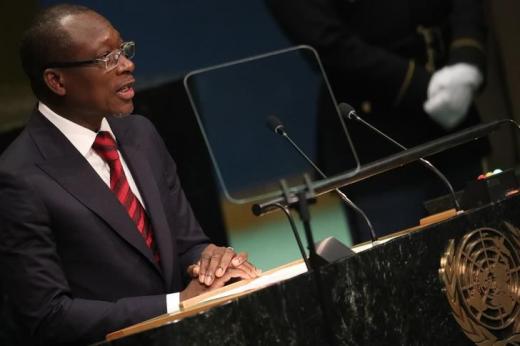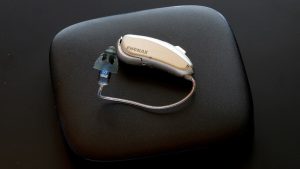Benin has a reputation as one of West Africa’s most stable democracies but a series of court cases against opponents of President Patrice Talon has led to accusations that his rivals are being targeted, forcing some to flee the country.
One of those opponents is former presidential candidate and multi-millionaire Sebastien Ajavon, who has been sentenced to 20 years in prison for drug trafficking.
Dubbed Benin’s “Chicken King” due to his investments in livestock, Ajavon came third in the 2016 presidential election and went on to help Talon win the second round.
But he made no secret of his desire to contest the presidency again and their relationship soured. That is when, his supporters say, Ajavon’s legal problems resurfaced.
“The regime of President Talon is tracking down opponents,” an official from Ajavon’s political party USL, Donklam Abalo, told AFP.
“His (Ajavon’s) lawyers were prevented from defending their client,” he said.
Ajavon was sentenced in October despite being cleared of any involvement in the same drug case two years earlier.
Persecution
After Talon, who made his fortune in cotton, won the presidency, he promised to stamp out corruption and mismanagement in the tiny West African nation.
In recent months, former ministers accused of fraud have lost their parliamentary immunity.
A special court to handle economic crimes and terrorism has been set up and already has a reputation for handing down heavy sentences.
Controversially, its decisions are not subject to appeal.
Some politicians have left the country, saying they are victims of legal “persecution” ahead of parliamentary elections next year.
Ajavon, who did not attend his drugs trial, was said to be in France, according to his lawyers.
An international arrest warrant has been issued against him.
He “did now show up because he thinks he has no guarantee of impartial justice,” said Abalo. He said the case against Ajavon was “completely baseless”.
In exile
Talon’s other main rival in the 2016 election, former prime minister Lionel Zinsou, is also facing legal problems and no longer in the country.
He has been accused of not repaying campaign funds — worth $26 million — to a company called Ebomaf.
Relatives told AFP Zinsou’s fear of the Benin authorities meant he skipped his daughter’s wedding in the country earlier this month, instead remaining in Paris, where he lives.
“With this regime that wants everyone out of the way at all costs, he preferred not to take risks by setting foot in the country,” said one of Zinsou’s relatives, speaking on condition of anonymity.
Another politician, Leonce Houngbadji of the People’s Liberation Party, has also gone into self-imposed exile.
Known for his fiery anti-Talon speeches, Houngbadji said he had to leave Benin in late October after receiving threats of “poisoning and kidnapping”.
“None of my complaints addressed to the state prosecutor about the threats against me have materialised,” Houngbadji said, speaking from Paris.
“I am in exile because I’m disturbing them.”
The Benin government denied it was becoming more authoritarian and maintained no one was exempt from Talon’s anti-corruption crusade.
The opposition claims were “pathetic”, said a source close to the presidency on condition of anonymity.
The source cited the case of Mohamed Atao Hinnouho, a politician in the ruling coalition currently imprisoned for drug trafficking and customs fraud.
“Our justice system is independent. If the people targeted by proceedings have nothing to fear they can come and defend their honour rather than flee abroad,” said the source.
Before becoming president, Talon also lived in exile.
He fled to France after being accused of an apparent poisoning plot against former head of state Thomas Boni Yayi in 2012.
He strongly denied the allegations and received a presidential pardon in May 2014, before later returning to Benin.






